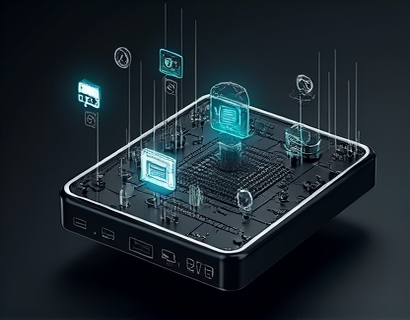AI-Powered Healthcare Solutions: Revolutionizing Personalized Medical Support
In the rapidly evolving landscape of healthcare, the integration of artificial intelligence (AI) is transforming the way medical support is delivered. AI-powered healthcare solutions are at the forefront of a new era, offering personalized medical support and expert advice to individuals in real-time. This shift towards advanced technology is not only enhancing the quality of healthcare but also making it more accessible and efficient. The goal is to empower individuals to make informed health decisions, thereby improving their overall well-being.
The Role of AI in Healthcare
AI in healthcare encompasses a wide range of applications, from diagnostic tools to predictive analytics and personalized treatment plans. The core advantage of AI lies in its ability to process and analyze vast amounts of data quickly and accurately. This capability is particularly valuable in healthcare, where timely and precise information can significantly impact patient outcomes. By leveraging machine learning algorithms, AI systems can identify patterns and insights that might be missed by human practitioners, leading to more accurate diagnoses and tailored treatment strategies.
Personalized Medical Support
One of the most significant benefits of AI-powered healthcare solutions is the ability to provide personalized medical support. Traditional healthcare models often struggle to offer one-size-fits-all solutions, which can lead to suboptimal patient care. AI-driven platforms, however, can analyze an individual's medical history, genetic information, lifestyle, and real-time health data to create customized health recommendations. This personalized approach ensures that patients receive advice and interventions that are specifically tailored to their unique needs, enhancing the effectiveness of the care they receive.
Instant Access to Expert Advice
With AI-powered healthcare solutions, users can gain instant access to expert medical advice without the need for in-person consultations. This is particularly beneficial for individuals living in remote areas or those with limited mobility. Through natural language processing and advanced algorithms, these platforms can understand and respond to user queries with a level of accuracy and empathy that mimics human expertise. Whether it's symptom checking, medication guidance, or general health advice, users can receive timely and reliable information to help them make informed decisions about their health.
Enhancing Patient Engagement
AI-powered healthcare solutions are not just about providing information; they are also designed to enhance patient engagement. By offering interactive tools and personalized insights, these platforms encourage users to take a more active role in managing their health. For instance, AI-driven apps can track vital signs, monitor chronic conditions, and provide real-time feedback on lifestyle changes. This level of engagement can lead to better adherence to treatment plans, improved health outcomes, and a greater sense of control over one's well-being.
Predictive Analytics and Early Intervention
Another critical aspect of AI in healthcare is its ability to predict potential health issues before they become severe. Through advanced analytics and machine learning, AI systems can identify early warning signs of diseases such as diabetes, heart disease, and cancer. By detecting these conditions at an early stage, healthcare providers can intervene more effectively, often leading to better treatment outcomes and reduced healthcare costs. This proactive approach to healthcare is a significant step forward in preventing illnesses and promoting long-term health.
Integration with Electronic Health Records
The integration of AI with electronic health records (EHRs) is a game-changer in healthcare. EHRs contain a wealth of patient data, including medical history, lab results, and treatment records. AI algorithms can analyze this data to provide comprehensive insights and recommendations. For example, AI can help identify potential drug interactions, suggest alternative treatments based on a patient's medical history, and even predict hospital readmission risks. This seamless integration ensures that healthcare providers have access to up-to-date and accurate information, enabling them to deliver more personalized and effective care.
Challenges and Considerations
While the benefits of AI in healthcare are undeniable, there are also challenges and considerations that need to be addressed. One of the primary concerns is data privacy and security. Patient data is highly sensitive, and ensuring its protection is paramount. AI systems must be designed with robust security measures to prevent data breaches and maintain patient trust. Additionally, there is a need for regulatory frameworks to govern the use of AI in healthcare, ensuring that these technologies are safe, effective, and ethically sound.
Case Studies and Success Stories
Several healthcare organizations and tech companies have successfully implemented AI-powered solutions, demonstrating their potential to transform patient care. For instance, a leading hospital system integrated an AI-driven diagnostic tool that significantly reduced the time required to diagnose complex cases. Another example is a telehealth platform that uses AI to match patients with the most suitable healthcare providers based on their specific needs and preferences. These success stories highlight the practical benefits of AI in healthcare and inspire further innovation in the field.
Patient-Centric Design
To maximize the impact of AI-powered healthcare solutions, it is crucial to adopt a patient-centric design approach. This means involving patients and healthcare providers in the development process to ensure that the solutions meet real-world needs and are user-friendly. By focusing on the user experience, these platforms can overcome barriers to adoption and ensure that the benefits of AI are accessible to a wide range of users. Additionally, incorporating feedback from users can help refine and improve the solutions over time.
The Future of AI in Healthcare
As AI technology continues to advance, its role in healthcare is expected to expand even further. Future developments may include more sophisticated predictive models, enhanced virtual reality applications for therapy, and more integrated AI systems within healthcare facilities. The goal is to create a seamless and holistic healthcare experience where AI complements human expertise, leading to better patient outcomes and a more efficient healthcare system. The potential for AI to revolutionize healthcare is vast, and the journey towards realizing this potential is just beginning.
In conclusion, AI-powered healthcare solutions are empowering individuals to take control of their health like never before. By providing instant personalized medical support and expert advice, these platforms are transforming the way people make health decisions and manage their well-being. As the technology continues to evolve, the future of healthcare looks promising, with AI playing a central role in delivering high-quality, personalized care to all.










































